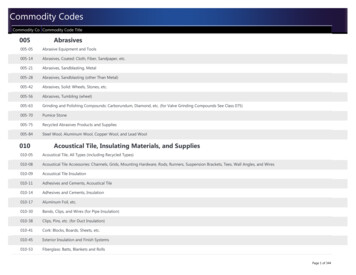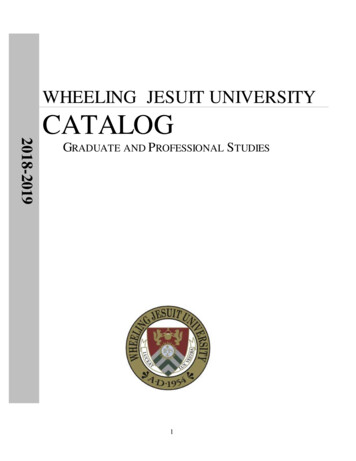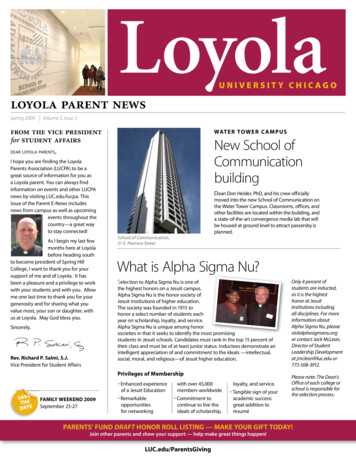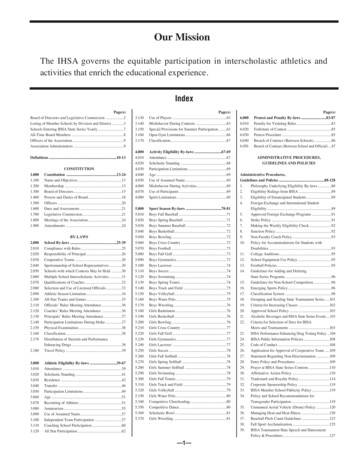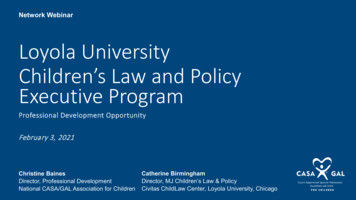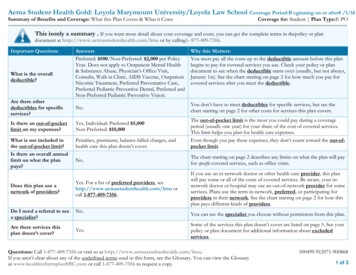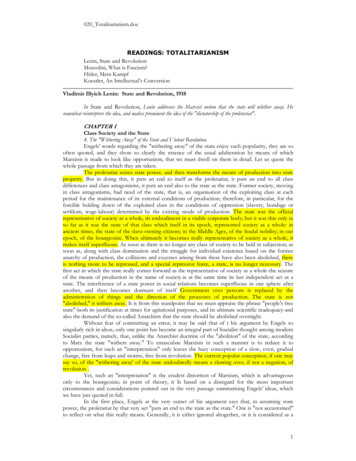
Transcription
020 Totalitarianism.docREADINGS: TOTALITARIANISMLenin, State and RevolutionMussolini, What is Fascism?Hitler, Mein KampfKoestler, An Intellectual’s ConversionVladimir Illyich Lenin: State and Revolution, 1918In State and Revolution, Lenin addresses the Marxist notion that the state will whither away. Hesomewhat reinterprets the idea, and makes prominent the idea of the "dictatorship of the proletariat".CHAPTER IClass Society and the State4. The "Withering Away" of the State and Violent Revolution.Engels' words regarding the "withering away" of the state enjoy such popularity, they are sooften quoted, and they show so clearly the essence of the usual adulteration by means of whichMarxism is made to look like opportunism, that we must dwell on them in detail. Let us quote thewhole passage from which they are taken.The proletariat seizes state power, and then transforms the means of production into stateproperty. But in doing this, it puts an end to itself as the proletariat, it puts an end to all classdifferences and class antagonisms, it puts an end also to the state as the state. Former society, movingin class antagonisms, had need of the state, that is, an organisation of the exploiting class at eachperiod for the maintenance of its external conditions of production; therefore, in particular, for theforcible holding down of the exploited class in the conditions of oppression (slavery, bondage orserfdom, wage-labour) determined by the existing mode of production. The state was the officialrepresentative of society as a whole, its embodiment in a visible corporate body; but it was this only inso far as it was the state of that class which itself in its epoch, represented society as a whole: inancient times, the state of the slave-owning citizens; in the Middle Ages, of the feudal nobility; in ourepoch, of the bourgeoisie. When ultimately it becomes really representative of society as a whole, itmakes itself superfluous. As soon as there is no longer any class of society to be held in subjection; assoon as, along with class domination and the struggle for individual existence based on the formeranarchy of production, the collisions and excesses arising from these have also been abolished, thereis nothing more to be repressed, and a special repressive force, a state, is no longer necessary. Thefirst act in which the state really comes forward as the representative of society as a whole-the seizureof the means of production in the name of society-is at the same time its last independent act as astate. The interference of a state power in social relations becomes superfluous in one sphere afteranother, and then becomes dormant of itself Government over persons is replaced by theadministration of things and the direction of the processes of production. The state is not"abolished," it withers away. It is from this standpoint that we must appraise the phrase "people's freestate"-both its justification at times for agitational purposes, and its ultimate scientific inadequacy-andalso the demand of the so-called Anarchists that the state should be abolished overnight.Without fear of committing an error, it may be said that of t his argument by Engels sosingularly rich in ideas, only one point has become an integral part of Socialist thought among modernSocialist parties, namely, that, unlike the Anarchist doctrine of the "abolition" of the state, accordingto Marx the state "withers away." To emasculate Marxism in such a manner is to reduce it toopportunism, for such an "interpretation" only leaves the hazy conception of a slow, even, gradualchange, free from leaps and storms, free from revolution. The current popular conception, if one maysay so, of the "withering away' of the state undoubtedly means a slurring over, if not a negation, ofrevolution .Yet, such an "interpretation" is the crudest distortion of Marxism, which is advantageousonly to the bourgeoisie; in point of theory, it Is based on a disregard for the most importantcircumstances and considerations pointed out in the very passage summarising Engels' ideas, whichwe have just quoted in full.In the first place, Engels at the very outset of his argument says that, in assuming statepower, the proletariat by that very act "puts an end to the state as the state." One is "not accustomed"to reflect on what this really means. Generally, it is either ignored altogether, or it is considered as a1
020 Totalitarianism.docpiece of "Hegelian weakness" on Engels' part. As a matter of fact, however, these words expresssuccinctly the experience of one of the greatest proletarian revolutions-the Paris Commune of 1871,of which we shall speak in greater detail in its proper place. As a matter of fact, Engels speaks here ofthe destruction o the bourgeois state by the proletarian revolution, while the word about its witheringaway refer to the remains of proletarian statehood after the Socialist revolution. The bourgeois statedoes not "wither away" according to Engels, but is "put all end to" by the proletariat in the course ofthe revolution What withers away after the revolution is the proletarian state or semi state.Secondly, the state is a "special repressive force." This splendid and extremely profounddefinition of Engels is given by him here with complete lucidity. It follows from this that the "specialrepressive force" of the bourgeoisie for the suppression of the proletariat, of the millions of workersby a handful of the rich, must be replaced by a "special repressive force" of the proletariat for thesuppression o the bourgeoisie (the dictatorship of the proletariat). It is just this that constitutes thedestruction of "the state as the state." It is just as that constitutes the "act" of "the seizure of themeans of production in the name of society." And it is obvious that such a substitution of one(proletarian) "special repressive force" for another (bourgeois) "special repressive force" can in noway take place in the form of a "withering away."Thirdly, as to the "withering away" or, more expressively and colourfully as to the state"becoming dormant," Engels refers quite clearly and definitely to the period after "the seizure of themeans of production [by the state] in the name of society," that is, after the Socialist revolution. We allknow that the political form of the "state" at that time is complete democracy. But it never enters thehead of any of the opportunists who shamelessly distort Marx that when Engels speaks here of thestate "withering away," of "becoming dormant," he speaks of democracy. At first sight this seems verystrange. But it is "unintelligible" only to one who has not reflected on the fact that democracy is also astate and that, consequently, democracy will also disappear when the state disappears. The bourgeoisstate can only be "put an end to" by a revolution. The state in general, i.e., most complete democracy,can only "wither away."***The replacement of the bourgeois by the proletarian state is impossible without a violentrevolution. The abolition of the proletarian state, i.e., of all states, is only possible through "witheringaway."CHAPTER VThe Economic Base of the Withering Away of the State1. Formulation of the Question by Marx.***The whole theory of Marx is an application of the theory of evolution-in its most consistent,complete, well-considered and fruitful form-to modern capitalism. It was natural for Marx to raise thequestion of applying this theory both to the coming collapse of capitalism and to the future evolutionof future communism.On the basis of what data can the future evolution of future Communism be considered?On the basis of the fact that it has its origin in capitalism, that it develops historically fromcapitalism, that it is the result of the action of a social force to which capitalism has given birth. There isno shadow of an attempt on Marx's part to conjure up a Utopia, to make idle guesses about thatwhich cannot be known. Marx treats the question of Communism in the same way as a naturalistwould treat the question of the evolution of, say, a new biological species, if he knew that such andsuch was its origin, and such and such the direction in which it changed.***The first fact that has been established with complete exactness by the whole theory ofevolution, by science as a whole-a fact which the Utopians forgot, and which is forgotten by thepresent-day opportunists who are afraid of the Socialist revolution-is that, historically, there mustundoubtedly be a special state or epoch of transition from capitalism to Communism.2. Transition From Capitalism to Communism.Marx continues:Between capitalist and Communist society lies the period of the revolutionary transformation of the former intothe latter To this also corresponds a political transition period, in which the state can be no other than the revolutionarydictatorship of the proletariat.2
020 Totalitarianism.docThis conclusion Marx basses on all analysis of the role played by the proletariat in moderncapitalist society, on the data concerning the evolution of this society, and on the irreconcilability ofthe opposing interests of the proletariat and the bourgeoisie .Earlier the question was put thud to attain its emancipation? the proletariat must overthrowthe bourgeoisie, conquer political power and establish its own revolutionary dictatorship.Now the question is put somewhat differently: the transition from capitalist society,developing towards Communism, towards a Communist society, is impossible without a "politicaltransition period," and the State in this period can only be the revolutionary dictatorship of theproletariat.What, then, is the relation of this dictatorship to democracy?We have seen that the Communist Manifesto simply places side by side the two ideas: the"transformation of the proletariat into the ruling class" and the "establishment of democracy." On thebasis of all that has been said above, one can define more exactly how democracy changes in thetransition from capitalism to Communism.In capitalist society, under the conditions most favourable to its development, we have moreor less complete democracy in the democratic republic. But this democracy is always bound by thenarrow framework of capitalist exploitation, and consequently always remains, in reality, a democracyfor the minority, only for the possessing classes, only for the rich. Freedom in capitalist society alwaysremains just about the same as it was in the ancient Greek republics: freedom for the slave owners.The modern wageslaves, owing to the conditions of capitalist exploitation are so much crushed bywant and poverty that "democracy is nothing to them," "politics is nothing to them"; that, in theordinary peaceful course of events, the majority of the population is debarred from participating insocial and political life.The correctness of this statement is perhaps most clearly proved by Germany, just becausein this state constitutional legality lasted and remained stable for a remarkably long time-for nearly halfa century (18711914)-and because Social Democracy in Germany during that time was able to achievefar more than in other countries in "utilising legality," and was able to organise into a political party alarger proportion of the working class than anywhere in the world.What, then, is this largest proportion of politically conscious and active wage-slaves that hasso far been observed in capitalist society? One million members of the Social Democratic party-out offifteen million wageworkers. Three million organised in trade unions-out of fifteen million.Democracy for an insignificant minority, democracy for the rich- that is the democracy ofcapitalist society. If we look more closely into the mechanism of capitalist democracy, everywhere,both in the "petty" - so called petty - details of the suffrage (residential qualification, exclusion ofwomen, etc.), and in the technique of the representative institution, in the actual obstacles to the rightof assembly (public buildings are not for "beggars"!), in the purely capitalist organisation of the dailypress, etc., etc.-on all sides we see restriction after restriction upon democracy. These restrictions,exceptions, exclusions obstacles for the poor, seem slight, especially in the eyes of one who hashimself never known want and has never been in close contact with the oppressed classes in theirmass life (and nine tenths, if not ninety-nine hundredths, of the bourgeois publicists and politiciansare of this class), but in their sum total these restrictions exclude and squeeze out the poor frompolitics and from an active share in democracy.Marx splendidly grasped this essence of capitalist democracy, when, in analysing theexperience of the Commune, he said that the oppressed were allowed, once every few years, to decidewhich particular representatives of the oppressing class should be in parliament to represent andrepress them!But from this capitalist democracy-inevitably narrow, subtly rejecting the poor, and thereforehypocritical and false to the core- progress does not march onward, simply, smoothly and directly, to"greater and greater democracy," as the liberal professors and petty bourgeois opportunists wouldhave us believe. No, progress marches onward, i.e., towards Communism, through the dictatorship ofthe proletariat; it cannot do otherwise, for there is no one else and no other way to break the resistanceof the capitalist exploiters.But the dictatorship of the proletariat-i.e., the organisation of the vanguard of the oppressedas the ruling class for the purpose of crushing the oppressors cannot produce merely an expansion ofdemocracy. Together with an immense expansion of democracy which for the first time becomesdemocracy for the poor, democracy for the people, and not democracy for the rich folk, thedictatorship of the proletariat produces a series of restrictions of liberty in the case of the oppressors,3
020 Totalitarianism.docthe exploiters, the capitalists. We must crush them in order to free humanity from wage slavery; theirresistance must be broken by force; it is clear that where there is suppression there is also violence,there is no liberty, no democracy.Engels expressed this splendidly in his letter to Bebel when he said, as the reader willremember, that "as long as the proletariat still needs the state, it needs it not in the interests of freedom,but for the purpose of crushing its antagonists; and as soon as it becomes possible to speak offreedom, then the state, as such, ceases to exist."Democracy for the vast majority of the people, and suppression by force, i.e., exclusion fromdemocracy, of the exploiters and oppressors of the people-this is the modification of democracyduring the transition from capitalism to Communism.Only in Communist society, when the resistance of the capitalists has been completelybroken, when the capitalists have disappeared, when there are no classes (i.e., there is no differencebetween the members of society in their relation to the social means of production), only then "thestate ceases to exist," and it becomes possible to speak of freedom." Only then a really full democracy, ademocracy without any exceptions, will be possible and will be realised. And only then will democracyitself begin to wither away due to the simple fact that, freed from capitalist slavers from the untoldhorrors, savagery, absurdities, and infamies of capitalist exploitation, people will gradually becomeaccustomed to the observance of the elementary rules of social life that have been known for centuriesand repeated for thousands of years in all school books they will become accustomed to observingthem without force, with out compulsion, without subordination, without the special apparatus forcompulsion which is called the state.The expression "the state withers away," is very well chosen, for it indicates both the gradualand the elemental nature of the process. Only habit can, and undoubtedly will, have such an effect; forwe sec around us millions of times how readily people get accustomed to observe the necessary rulesof life in common, if there is no exploitation, if there is nothing that causes indignation, that callsforth protest and revolt and has to be suppressed.Thus, in capitalist society, we have a democracy that is curtailed, poor, false; a democracyonly for the rich, for the minority. The dictatorship of the proletariat, the period of transition toCommunism, will, for the first time, produce democracy for the people, for the majority, side by sidewith the necessary suppression of the minority-the exploiters. Communism alone is capable of givinga really complete democracy, and the more complete it is the more quickly will it become unnecessaryand wither away of itself.In other words: under capitalism we have a state in the proper sense of the word, that is,special machinery for the suppression of one class by another, and of the majority by the minority atthat. Naturally, for the successful discharge of such a task as the systematic suppression by theexploiting minority of the exploited majority, the greatest ferocity and savagery of suppression arerequired, seas of blood are required through which mankind is marching in slavery, serfdom, andwage-labor.Again, during the transition from capitalism to Communism, suppression is still necessary; butit is the suppression of the minority of exploiters by the majority of exploited. A special apparatus,special machinery for suppression, the "state," is still necessary, but this is now a transitional state, nolonger a state in the usual sense, for the suppression of the minority of exploiters, by the majority ofthe wage-slaves of yesterday, is a matter comparatively so easy, simple and natural that it will cost farless bloodshed than the suppression of the risings of slaves, serfs or wage laborers, and will costmankind far less. This is compatible with the diffusion of democracy among such an overwhelmingmajority of the population, that the need for special machinery of suppression will begin to disappear.The exploiters are, naturally, unable to suppress the people without a most complex machinery forperforming this task; but the people can suppress the exploiters even with very simple "machinery,"almost without any "machinery," without any special apparatus, by the simple organisation of the armedmasses (such as the Soviets of Workers' and Soldiers Deputies, we may remark. anticipating a little).Finally, only Communism renders the state absolutely unnecessary, for there is no one to besuppressed-"no one" in the sense of a class, in the sense of a systematic struggle with a definite sectionof the population. We are not Utopians, and we do not in the least deny the possibility andinevitability of excesses on the part of individual persons, nor the need to suppress such excesses. But, inthe first place, no special machinery, no special apparatus of repression is needed for this; this will bedone by the armed people itself, as simply and as readily as any crowd of civilised people, even inmodern society, parts a pair of combatants or does not allow a woman to be outraged. And, secondly,4
020 Totalitarianism.docwe know that the fundamental social cause of excesses which consist in violating the rules of sociallife is the exploitation of the masses, their want and their poverty. With the removal of this chiefcause, excesses will inevitably begin to "wither away." We do not know how quickly and in whatsuccession, but we know that they will wither away. With their withering away, the state will also witheraway.Without going into Utopias, Marx defined more fully what can now be defined regarding thisfuture, namely, the difference between the lower and higher phases (degrees, stages) of Communistsociety.***[V. I. Lenin, State and Revolution (New York: International Publishers Co., Inc., 1932), pp. 1517, 20, 70-75, 7885. ]Benito Mussolini: What is Fascism? 1932Benito Mussolini (1883-1945) over the course of his lifetime went from Socialism - he was editor of Avanti,a socialist newspaper - to the leadership of a new political movement called "fascism" [after "fasces", the symbol of boundsticks used a totem of power in ancient Rome]. Mussolini came to power after the "March on Rome" in 1922, and wasappointed Prime Minister by King Victor Emmanuel. In 1932 Mussolini wrote (with the help of Giovanni Gentile)and entry for the Italian Encyclopedia on the definition of fascism.Fascism, the more it considers and observes the future and the development of humanityquite apart from political considerations of the moment, believes neither in the possibility nor theutility of perpetual peace. It thus repudiates the doctrine of Pacifism -- born of a renunciation of thestruggle and an act of cowardice in the face of sacrifice. War alone brings up to its highest tension allhuman energy and puts the stamp of nobility upon the peoples who have courage to meet it. All othertrials are substitutes, which never really put men into the position where they have to make the greatdecision -- the alternative of life or death.The Fascist accepts life and loves it, knowing nothing of and despising suicide: he rather conceives of life asduty and struggle and conquest, but above all for others -- those who are at hand and those who are far distant,contemporaries, and those who will come after.Fascism [is] the complete opposite of Marxian Socialism, the materialist conception ofhistory of human civilization can be explained simply through the conflict of interests among thevarious social groups and by the change and development in the means and instruments ofproduction. Fascism, now and always, believes in holiness and in heroism; that is to say, in actionsinfluenced by no economic motive, direct or indirect. And if the economic conception of history bedenied, according to which theory men are no more than puppets, carried to and fro by the waves ofchance, while the real directing forces are quite out of their control, it follows that the existence of anunchangeable and unchanging class-war is also denied - the natural progeny of the economicconception of history. And above all Fascism denies that class-war can be the preponderant force inthe transformation of society.After Socialism, Fascism combats the whole complex system of democratic ideology, andrepudiates it, whether in its theoretical premises or in its practical application. Fascism denies that themajority, by the simple fact that it is a majority, can direct human society; it denies that numbers alonecan govern by means of a periodical consultation, and it affirms the immutable, beneficial, and fruitfulinequality of mankind, which can never be permanently leveled through the mere operation of amechanical process such as universal suffrage.Fascism denies, in democracy, the absur[d] conventional untruth of political equalitydressed out in the garb of collective irresponsibility, and the myth of "happiness" and indefiniteprogress.Given that the nineteenth century was the century of Socialism, of Liberalism, and ofDemocracy, it does not necessarily follow that the twentieth century must also be a century ofSocialism, Liberalism and Democracy: political doctrines pass, but humanity remains, and it mayrather be expected that this will be a century of authority.a century of Fascism. For if the nineteenthcentury was a century of individualism it may be expected that this will be the century of collectivismand hence the century of the State.The foundation of Fascism is the conception of the State, its character, its duty, and its aim.Fascism conceives of the State as an absolute, in comparison with which all individuals or groups are5
020 Totalitarianism.docrelative, only to be conceived of in their relation to the State. The conception of the Liberal State isnot that of a directing force, guiding the play and development, both material and spiritual, of acollective body, but merely a force limited to the function of recording results: on the other hand, theFascist State is itself conscious and has itself a will and a personality -- thus it may be called the "ethic"State.The Fascist State organizes the nation, but leaves a sufficient margin of liberty to theindividual; the latter is deprived of all useless and possibly harmful freedom, but retains what isessential; the deciding power in this question cannot be the individual, but the State alone.For Fascism, the growth of empire, that is to say the expansion of the nation, is anessential manifestation of vitality, and its opposite a sign of decadence. Peoples which are rising, orrising again after a period of decadence, are always imperialist; and renunciation is a sign of decay andof death. Fascism is the doctrine best adapted to represent the tendencies and the aspirations of apeople, like the people of Italy, who are rising again after many centuries of abasement and foreignservitude. But empire demands discipline, the coordination of all forces and a deeply felt sense of dutyand sacrifice: this fact explains many aspects of the practical working of the regime, the character ofmany forces in the State, and the necessarily severe measures which must be taken against those whowould oppose this spontaneous and inevitable movement of Italy in the twentieth century, and wouldoppose it by recalling the outworn ideology of the nineteenth century - repudiated wheresoever therehas been the courage to undertake great experiments of social and political transformation; for neverbefore has the nation stood more in need of authority, of direction and order. If every age has its owncharacteristic doctrine, there are a thousand signs which point to Fascism as the characteristic doctrineof our time. For if a doctrine must be a living thing, this is proved by the fact that Fascism has createda living faith; and that this faith is very powerful in the minds of men is demonstrated by those whohave suffered and died for it.Adolf Hitler, Mein KampfThe longer I observed it the greater became my dislike for that mammoth city which greedilyattracts men to its bosom, in order to break them mercilessly in the end. When they came they stillfelt themselves in communion with their own people at home; if they remained that tie was broken. Iwas thrown about so much in the life of the metropolis that I experienced the workings of this fate inmy own person and felt the effects of it in my own soul. One thing stood out clearly before my eyes:It was the sudden changes from work to idleness and vice versa; so that the constant fluctions thuscaused by earnings and expenditure finally destroyed the sense of thrift for many people and also thehabit of regulating expenditure in an intelligent way.I have had actual experience e of all this inhundreds of cases. At first I was disgusted and indignant; but later on I came to recognize the wholetragedy of their misfortune and to understand the profound causes of it. They were the unhappyvictims of evil circumstances.I shudder even today when I think of the woeful dens in which peopledwelt, the night shelters and the slums, and all the tenebrous spectacles of ordure, loathsome filth andwickedness.Today I fervidly thank Providence for having sent me to such a school. There I couldnot refuse to take an interest in matters that did not please me.Even in those days I already saw thatthere was a two-fold method by which alone it would be possible to bring about an amelioration ofthese conditions. This method is: first, to create better fundamental conditions of social developmentby establishing a profound feeling for social responsibilities among the public; second, to combinethis feeling for social responsibilities with a ruthless determination to prune away all excrescenceswhich are incapable of being improved .In my eyes the charge against Judaism became a grave one the moment I discovered theJewish activities in the Press, in art, in literature and the theatre.One needed only to look at theposters announcing the hideous productions of the cinema and theatre, and study the names of theauthors who were highly lauded there in order to become permanently adamant on Jewish questions.Here was a pestilence, a moral pestilence, with which the public was being infected. It was worse thanthe Black Plague of long ago. And in what mighty doses this poison was manufactured anddistributed. .Sometimes it went so far that one of these fellow, acting like a sewage pump, wouldshoot his filth directly in the face of other members of the human race.The fact that nine-tenths ofall the smutty literature, artistic tripe and theatrical banalities had to be charged to the account ofpeople who formed scarcely one per cent of the nation -- that fact could not be gainsaid.A coldshiver ran down my spine when I first ascertained that it was the same kind of cold-blooded, thickskinned and shameless Jew who showed his consummate skill in conducting that revolting6
020 Totalitarianism.docexploitation of the dregs of the big city. Then I became fired with wrath.I had now no morehesitation about bringing the Jewish problem to light in all its details. No. Henceforth I wasdetermined to do so.I learned to track down the Jew in all the different spheres of cultural andartistic life, and in the various manifestations of this life everywhere.My inner struggle was at anend .With satanic joy in his face, the black-haired Jewish youth lurks in wait for the unsuspectinggirl whom he defiles with his blood, thus stealing her from her people. With every means he tries todestroy the racial foundations of the people he has set out to subjugate. Just as he himselfsystematically ruins women and girls, he does not shrink back from pulling down the blood barriersfor others, even on a large scale .I And so he tries systematically to lower the racial level by ac
Hitler, Mein Kampf Koestler, An Intellectual's Conversion Vladimir Illyich Lenin: State and Revolution, 1918 In State and Revolution, Lenin addresses the Marxist notion that the state will whither away. He somewhat reinterprets the idea, and makes prominent the idea of the "dictatorship of the proletariat". CHAPTER I Class Society and the .

